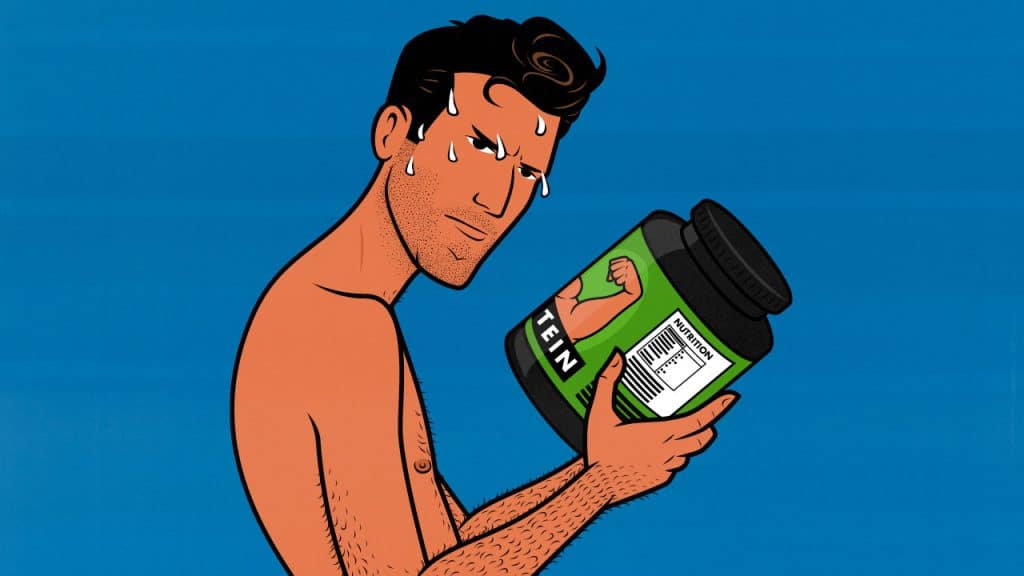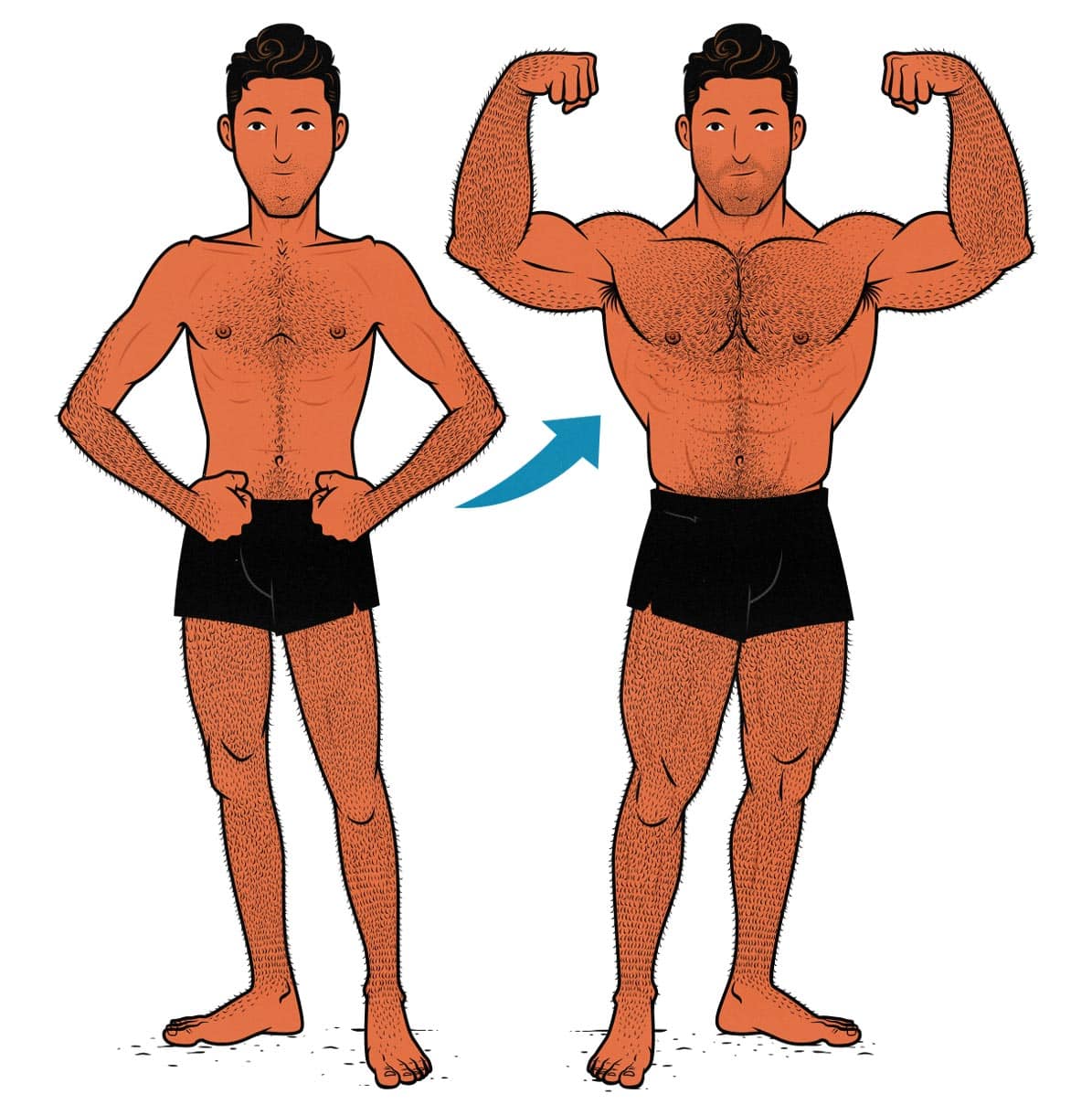
How Much Protein Powder Can You Have Per Day?
One of the most common questions we get is how much protein powder is too much protein powder? One scoop of whey per day is probably fine, right? But what about 2 scoops? 3 scoops? 4?
I’ve seen dozens of muscle-building studies where the researchers give participants upwards of 60 or even 90 grams of protein per day for several months in a row, measuring what effects it has on muscle growth.
There are other studies looking directly at how much protein powder you can safely have per day.

How Much Protein Powder Should You Have Per Day?
Most lifters try to eat around 1 gram of protein per pound bodyweight per day (2.2g/kg/day). That builds in a fairly hefty margin. Most research shows you can maximize your rate of muscle growth with as little as 0.7 grams of protein per pound per day (1.5g/kg/day). So, someone who weighs 150 pounds should be able to maximize their rate of muscle growth with around 105 grams of protein per day (study).
You can get that protein by eating regular foods, or you could get it by supplementing with protein powder, such as whey protein. Whey protein is especially popular during the “anabolic window” right after working out, but you can have it at any time of day.
So let’s imagine you’re aiming for 105 grams of protein, but you currently eat 75 grams. To get that missing 30 grams, you could have an extra serving of chicken breast, snack on some cottage cheese, or have a serving of protein powder.
Once you’ve hit that minimum target, there isn’t much of a reason to keep having more protein. There’s nothing wrong with having more protein, but it won’t give you much extra benefit, either. Most people don’t need 2–3 scoops of protein powder per day.
But let’s go deeper.
Getting Enough Vitamins and Minerals
Different foods contain different vitamins and minerals. When you eat a varied diet, you get a wider variety of vitamins and minerals. There are many ways to increase the variety of nutrients in your diet. You could snack on trail mix instead of peanuts. You could cook with more ingredients and spices. You could add more meals to your rotation. You could start blending up nutritious smoothies.

The same principle holds true with protein. In an ideal world, you’d get your protein from a variety of different sources, including fish, chicken, meat, legumes, whole grains, soy, nuts, seeds, and dairy. It’s okay to be vegetarian or vegan. It’s okay if you’re allergic to dairy. Choose from among the protein sources that suit you.
Protein powder has fewer vitamins and minerals than most other protein sources. You shouldn’t eat so much of it that it takes over your diet. However, if you’re eating protein powder in addition to what you’re already eating, then this isn’t a problem. It’s extra. Most of us are bulking, so no worry there.
How Much Protein Powder Is Too Much?
The next concern is that consuming too much protein powder could cause some sort of overdose. For example, many foods contain trace amounts of heavy metals, such as lead or mercury. When you eat too much of any one food, you increase the risk of overeating those trace minerals. It’s possible to consume too many fat-soluble vitamins and minerals (such as the vitamin A found in offal). That’s why eating a balanced diet is so important. You get little bits of lots of things instead of too much of any one thing.
As far as protein powder goes, heavy metals come from the soil, so you find more of them in plant-based protein powders (study). Still, that study concluded that you can have 3 servings of plant-based protein powder per day without any risk of overdoing it. (Note that serving sizes vary. They estimated the average serving size to be about 43 grams.)
If you’re having whey protein, think of it like a dairy product. If you’re lactose intolerant or allergic to dairy, you can run into problems when you have too much of it. The main symptom to watch out for is diarrhea. If you’re getting the runs, you’re having too much.
High-Protein Studies
There are many, many studies where participants consume 60–90 grams of protein powder per day for several months in a row. It’s the easiest way for researchers to ensure the participants get enough protein to maximize their rate of muscle growth. They tend to be just fine.
For example, in a study by Jose Antonio and colleagues, they gave the participants free access to whey protein for a full year, then told them to eat 1–1.5 grams of protein per pound of bodyweight per day (study). Many of the participants wound up consuming several servings of whey protein every day for an entire year. The researchers couldn’t find any negative health effects.
Bulking Isn’t Forever
In your day-to-day life, I’d strive for balance. Maybe you have a few servings of protein powder per week. Maybe you have a serving or two after your workouts. Maybe you have none at all.
But as my father likes to say, “Everything in moderation, including moderation.” To gain weight, build muscle, and bulk up, we need to eat more food than we’re used to eating. It’s not sustainable in the long run, but it needs to be sustainable for a few months. Protein powder often helps with that. Then, when you finish your bulk, you can ease back and find balance again.
We aren’t so different from those study participants. We need to find a way to eat enough protein (and calories) to maximize our rate of muscle growth. If we can’t get that protein from our diets, it might make sense, in the short term, to have 1–3 servings of protein powder per day.

Conclusion
In the longer term, you should try to eat a wide and varied diet, including a nice mix of protein sources: meat, poultry, seafood, dairy, nuts, seeds, legumes, whole grains, and soy. It’s okay if some of that protein comes from protein powder.
In the short term, if you’re embarking on a bulking challenge, it’s okay to increase your intake of protein powder. 1–3 servings per day is considered a “normal” intake (study). It’s very common among powerlifters, bodybuilders, and recreational lifters. It also seems to be safe.
During my earlier bulks, while I was gaining my first 40 pounds, I would have 2–3 servings of protein powder during my workouts and the occasional protein shake on rest days. I was training 3x per week, so that averaged out to about 1–2 servings of protein powder per day.
So, how much protein powder can you have per day? Probably as much as 3 servings. If you wanted to be more moderate, you could have 1 serving per day. The most conservative approach would be to have a serving after your workouts.

Alright, that’s it for now. If you want more muscle-building information, we have a free muscle-building newsletter. Or, if you want us to walk you through the entire process of bulking up, check out our Bony to Beastly Program. It includes a customizable workout routine, a bulking diet guide, a recipe book, and support from us in our online community.
We’ll help you get started, track your progress, answer all your questions, and give you feedback as you go through the program. Your results are fully guaranteed. We have an unconditional refund policy.

